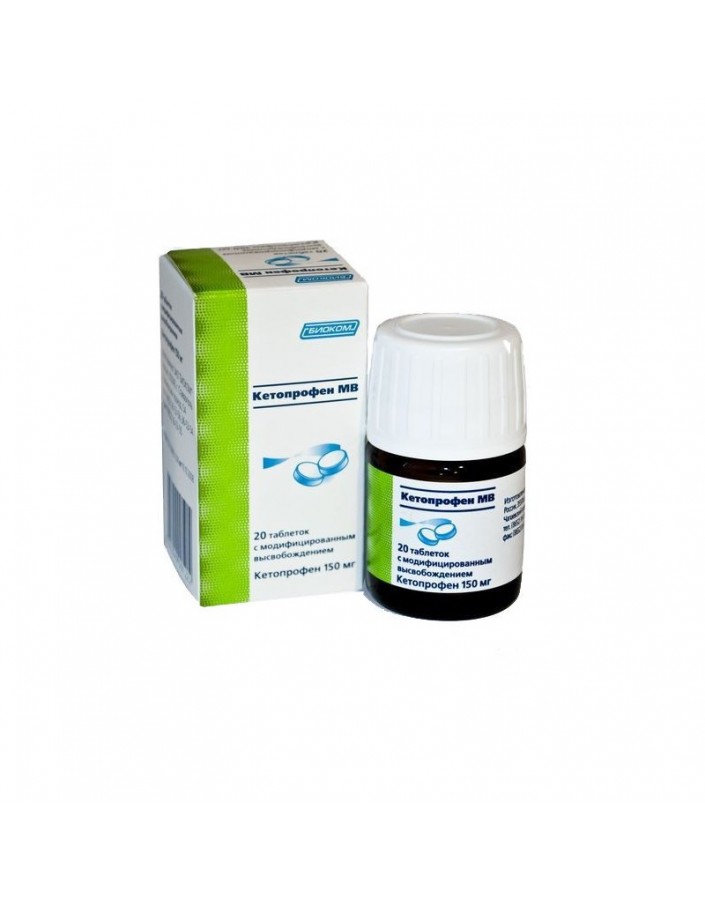




Security policy (edit with Customer reassurance module)

Delivery policy (edit with Customer reassurance module)

Return policy (edit with Customer reassurance module)
1 pill contains ketoprofen - 150 mg
100 pieces.
Ketoprofen is a non-steroidal anti-inflammatory drug, has anti-inflammatory, analgesic and antipyretic effects associated with the suppression of the activity of cyclooxygenases 1 and 2, which regulate the synthesis of prostaglandins and bradykinin; stabilizes lysosomal membranes.
Does not adversely affect the condition of the articular cartilage.
Inflammatory and degenerative diseases of the musculoskeletal system: rheumatoid, psoriatic arthritis, ankylosing spondylitis, ankylosing spondylitis, gouty arthritis, osteoarthritis.
The drug is intended for symptomatic therapy, reducing pain and inflammation at the time of use, does not affect the progression of the disease.
Pain syndrome: myalgia, ossalgia, neuralgia, tendonitis, arthralgia, bursitis, radiculitis, adnexitis, otitis media, headache and toothache, for oncological diseases; post-traumatic and postoperative pain, accompanied by inflammation, algomenorrhea.
Hypersensitivity to ketoprofen and other components of the drug, as well as to other nonsteroidal anti-inflammatory drugs. A complete or incomplete combination of asthma, recurrent nasal polyposes or paranasal sinuses, and intolerance to Acetylsalicylic acid or other NSAIDs (including a history). Peptic ulcer of the stomach and / or duodenum (acute stage), ulcerative colitis (acute stage), Crohn's disease; hemophilia and other disorders of blood coagulation; confirmed hyperkalemia; diverticulitis, peptic ulcer, active Gastrointestinal bleeding, inflammatory bowel disease; decompensated heart failure, the period after coronary artery bypass surgery; severe liver failure or active liver disease; severe renal failure (CC less than 30 ml / min), progressive kidney disease; children's age (up to 15 years); pregnancy (III trimester), breastfeeding period.
Ketoprofena is contraindicated in the third trimester of pregnancy.
In the first and second trimesters of pregnancy, prescribing is possible only if the intended benefit to the mother outweighs the potential risk to the fetus.
In the period of lactation while taking the drug, it is necessary to resolve the issue of stopping breastfeeding.
The drug should be taken orally, during or after a meal, 1 pill (150 mg) 1 time per day. pills should be swallowed whole, without chewing, with a large amount (at least 100 ml) of water or milk.
The minimum effective dose should be used with the shortest possible short course.
On the part of the digestive system: often - dyspepsia (nausea, diarrhea or constipation,
flatulence, vomiting, heartburn, loss of appetite,) NSAID-gastropathy, abdominal pain, stomatitis,
abnormal liver function; rarely - perforation of the gastrointestinal tract, exacerbation of Crohn's disease, melena, gingival, gastrointestinal, hemorrhoidal bleeding.
From the side of the central nervous system: often - headache, dizziness, insomnia, drowsiness, fatigue, agitation, nervousness, depression, asthenia; rarely - confusion or loss of consciousness, forgetfulness, migraine, peripheral neuropathy; very rarely - hallucinations, disorientation and speech disorder.
On the part of the senses: rarely - noise or tinnitus, blurred vision, change in taste, conjunctivitis, hearing loss, dryness of the mucous membrane of the eye, eye pain, conjunctival hyperemia, vertigo.
On the part of the cardiovascular system: rarely - tachycardia, arterial hypertension, peripheral edema.
From the side of blood-forming organs: ketoprofen reduces platelet aggregation, transient increase in the level of liver enzymes, rarely - agranulocytosis, anemia, thrombocytopenia, purpura, hemolytic anemia, leukopenia.
On the part of the urinary system: rarely - renal dysfunction, cystitis, urethritis, interstitial nephritis, nephrotic syndrome, hematuria (most often develop in people who take NSAIDs and diuretics for a long time).
Allergic reactions: often - skin reactions (itching, urticaria); rarely - rhinitis, shortness of breath, bronchospasm, angioedema, anaphylactoid reactions, exfoliative dermatitis.
Other: increased sweating, rarely - hemoptysis, nasal bleeding, menometrorrhagia, muscle twitching, thirst, photosensitization.
Ketoprofen can be taken with milk or taken with antacids to reduce the frequency of gastrointestinal disorders; Antacids and milk do not affect the absorbability of the drug.
During treatment, it is necessary to control the picture of peripheral blood and the functional state of the liver and kidneys, especially in elderly patients.
In case of impaired renal and liver function, a dose reduction and careful observation is necessary.
If necessary, determine the 17-ketosteroids drug should be canceled 48 hours before the study.
The drug may mask the signs of an infectious disease.
Do not use the drug at the same time as other NSAIDs.
During the period of treatment, care must be taken when driving vehicles and engaging in other potentially hazardous activities that require increased concentration and psychomotor reactions.
Ketoprofen may weaken the effect of diuretics and antihypertensive drugs and enhance the effects of oral hypoglycemic and some anticonvulsants (phenytoin).
Joint reception with other NSAIDs, glucocorticosteroids, salicylates, ethanol, corticotropin increases the risk of adverse effects from the gastrointestinal tract.
The simultaneous appointment with anticoagulants, thrombolytics, antiplatelet agents, as well as with cefaperazon, cefamandol, cefotetan and moxalactam increases the risk of bleeding.
At the same time taking nonsteroidal anti-inflammatory drugs with diuretics and ACE inhibitors increases the risk of renal dysfunction.
Increases plasma concentration of cardiac glycosides, slow Calcium channel blockers, lithium preparations, cyclosporine, Methotrexate.
Non-steroidal anti-inflammatory drugs may decrease the effectiveness of mifepristone. NSAID administration should begin no earlier than 8-12 days after the abolition of mifepristone.
Inductors of microsomal oxidation in the liver (phenytoin, ethanol, barbiturates, rifampicin, phenylbutazone, tricyclic antidepressants) increase the production of hydroxylated active metabolites.
Joint appointment with sodium valproate causes a violation of platelet aggregation.
Increases the hypoglycemic effect of insulin and oral hypoglycemic drugs (dose recalculation is required).
Myelotoxic drugs increase the hematotoxicity of the drug.
With ketoprofen overdose, like other nonsteroidal anti-inflammatory drugs, nausea, vomiting, vomiting with blood, abdominal pain, melena, impaired consciousness, respiratory depression, convulsions, impaired renal function and renal failure may occur.
There is no specific antidote.Treatment - symptomatic. The effects of ketoprofen on the gastrointestinal tract can be reduced by using H2 receptor antagonists, proton pump inhibitors and prostaglandins. Shown gastric lavage and the use of Activated carbon.
In a dry, dark place, at a temperature not higher than 25 ° C.
5 years.